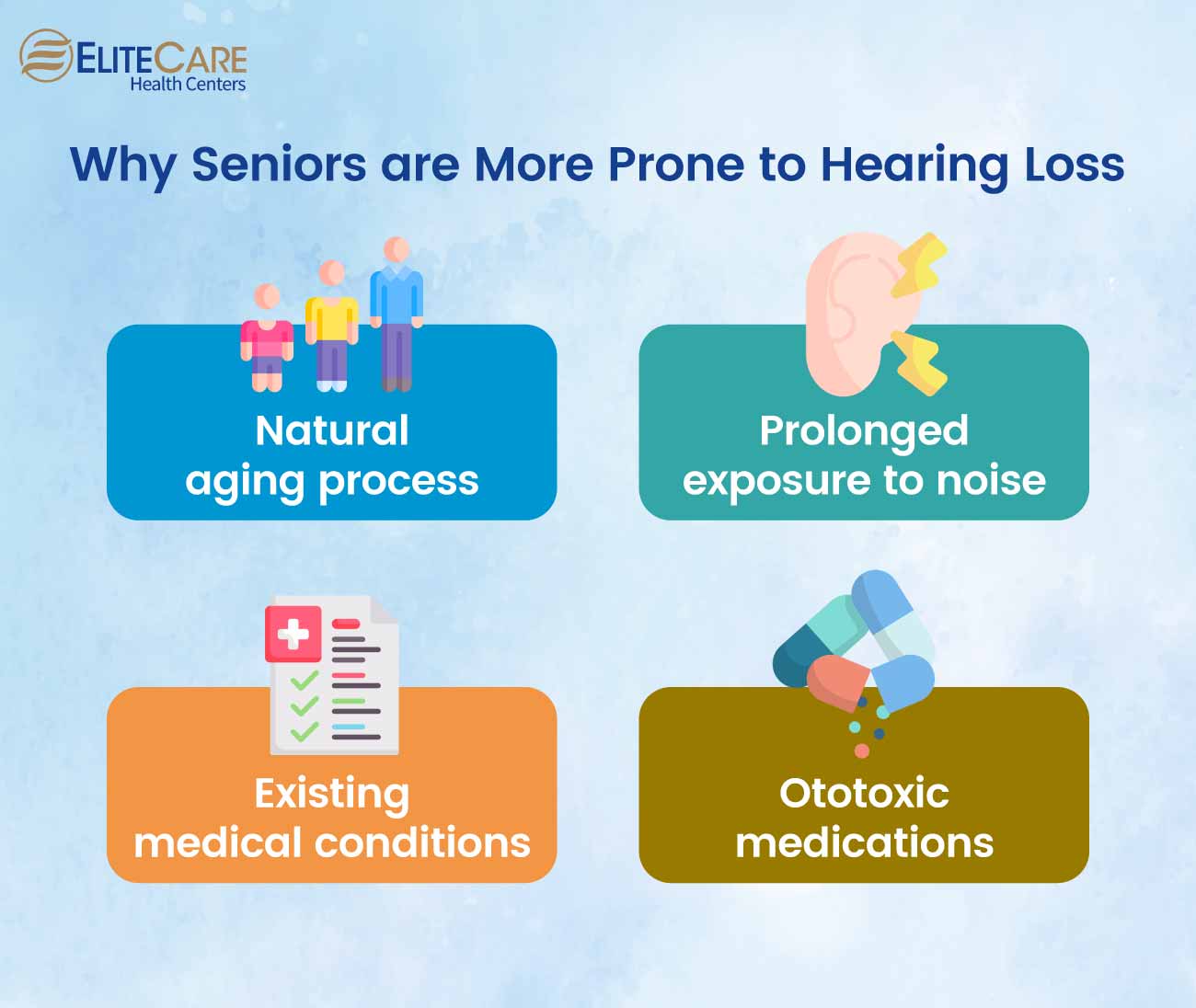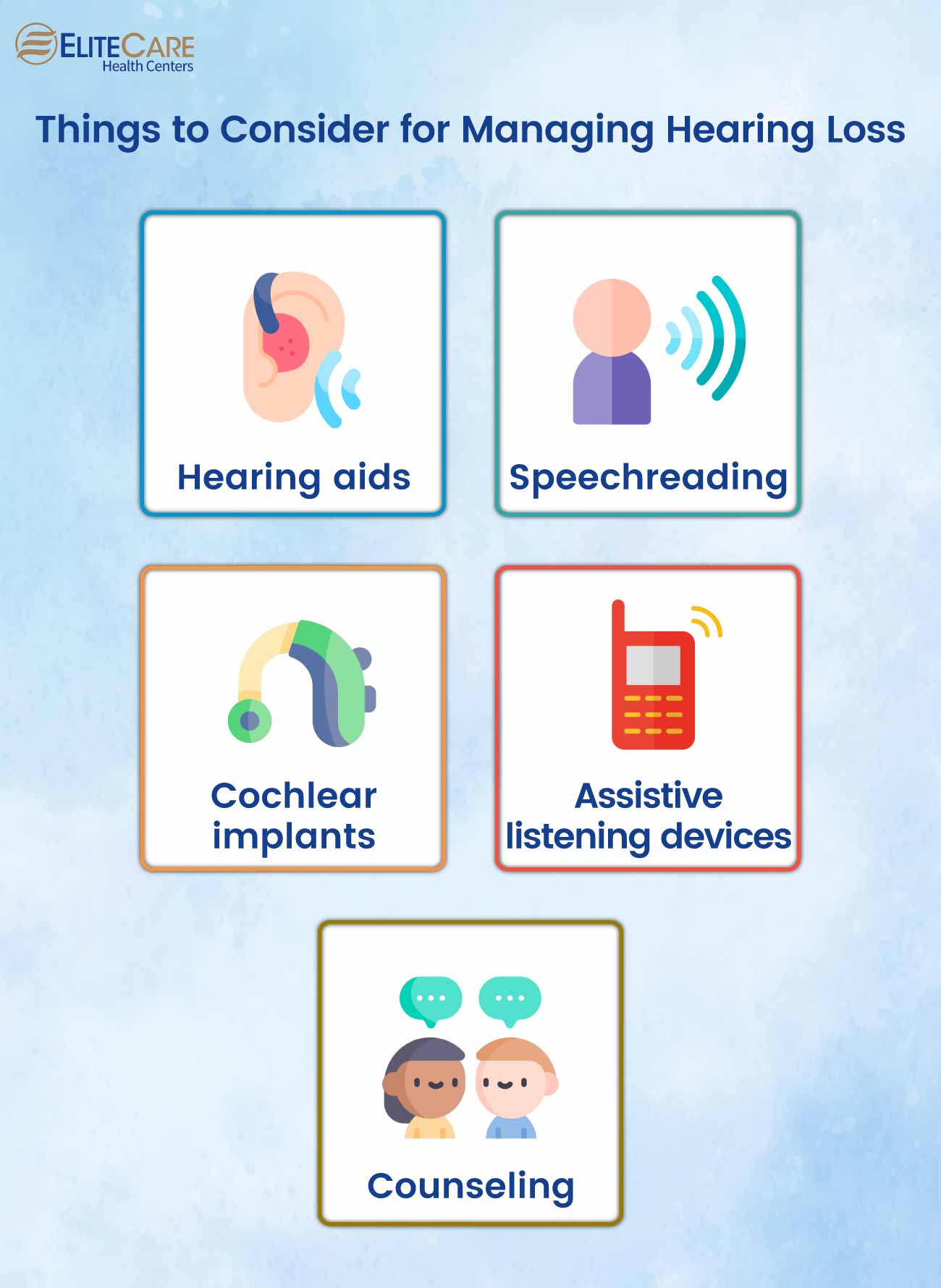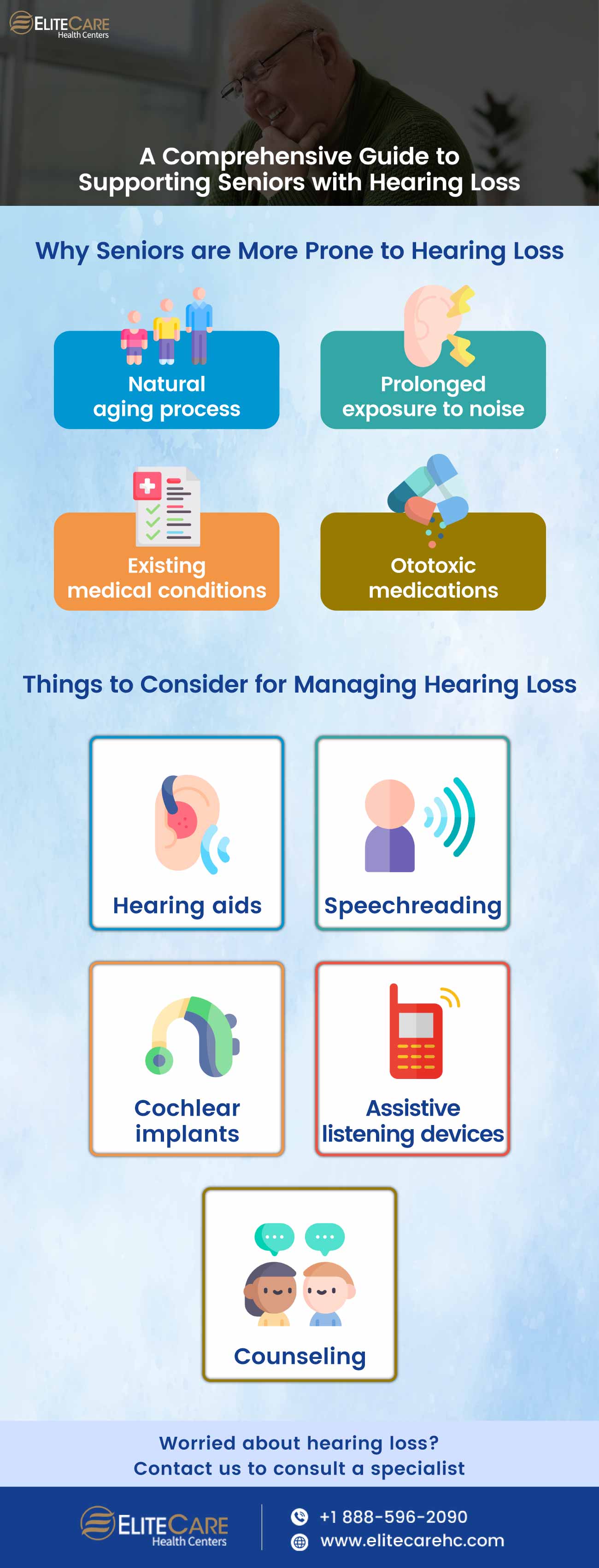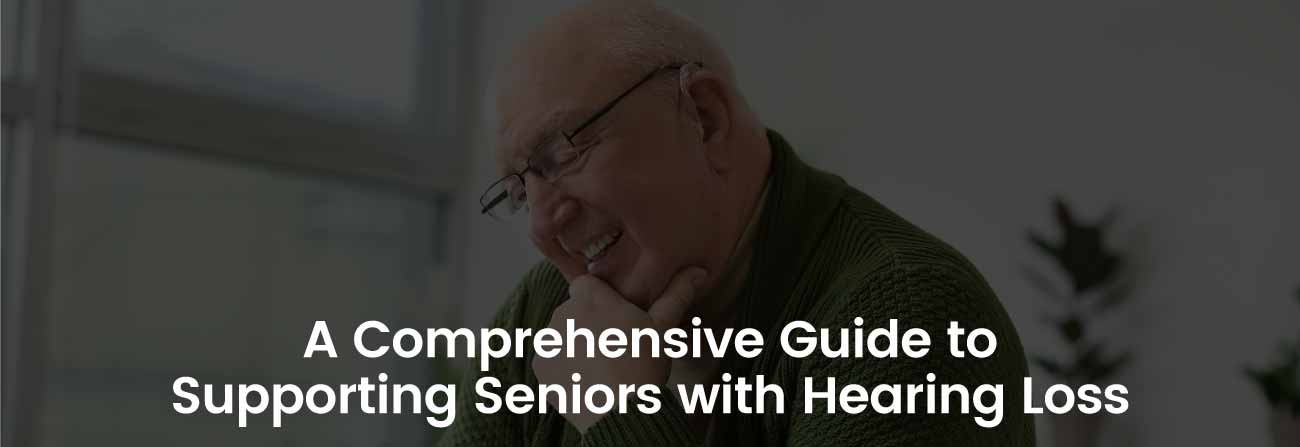
Hearing loss is a prevalent condition among older adults, affecting every one in three people aged between 65 to 74 in the United States. This condition gradually diminishes an individual’s ability to perceive sounds, understand speech, and fully engage in social interactions. Loss of hearing not only affects physical health but also has an impact on emotional well-being, cognitive function, and overall quality of life.
In this blog post, we will share detailed information about the causes of hearing loss, symptoms, and coping strategies to help individuals and their families proactively address this issue. Read on to learn more.
Why Seniors Are More Prone to Hearing Loss

Hearing loss can affect individuals of all ages, but it is more prevalent in older adults. The following are some common causes of hearing loss in seniors:
1. Natural aging process
Presbycusis is an age-related hearing disability commonly affecting the elderly. The delicate structures of the inner ear, including the cells which translate sound waves into electrical signals, gradually deteriorate with age. As a result, we lose our ability to perceive high-frequency sounds and understand speech clearly.
2. Exposure to noise over time
Prolonged exposure to loud noise throughout life can contribute to partial or complete hearing loss in seniors. Individuals working in construction or manufacturing, or those who are exposed to loud environments, are at an increased risk of losing their hearing ability.
In addition, some recreational activities like attending concerts, using personal listening devices at high volume for a long time, etc. can also damage the auditory system over time.
3. Medical conditions
Certain medical conditions, including cardiovascular disease and diabetes, can increase the risk of hearing loss. A senior who has reduced blood flow and oxygen supply to the delicate structures of the inner ear due to any cardiovascular condition may lose their hearing ability gradually with time. Similarly, individuals with diabetes are more likely to develop hearing loss because of the effects of high blood sugar levels on the blood vessels and nerves in the ears.
Additionally, seniors may also develop otosclerosis- a condition that involves abnormal bone growth in the middle ear, interfering with sound transmission and leading to hearing loss.
4. Medications
Some medications can have ototoxic (toxic to the ear) effects that may lead to hearing loss when taken at high doses or for extended periods. Ototoxic may be present in some antibiotics (e.g., gentamicin), diuretics (e.g., furosemide), chemotherapy drugs (e.g., cisplatin), and nonsteroidal anti-inflammatory drugs (NSAIDs).
Signs of Hearing Loss in Seniors
Difficulty understanding speech
Seniors with hearing loss may struggle to understand what others are saying, especially in noisy places or when several people are talking at once. They may often ask people to repeat themselves or miss out on conversations.
Increased volume
If seniors frequently turn up the volume on their television, radio, or other devices louder than usual, it could indicate hearing loss.
Misunderstanding conversations
Hearing loss can lead to misunderstanding of what is being spoken. If seniors frequently misinterpret what others are saying and respond inappropriately or give unrelated answers to questions, it may be a sign of hearing problems.
Tinnitus
This condition involves the perception of ringing, buzzing, or other noises in the ears. Seniors with hearing loss often experience tinnitus.
Individuals experiencing these signs should visit a healthcare clinic and consult a primary care physician or audiologist for a thorough evaluation.
Is It Possible to Treat Hearing Loss in Seniors?

1. Hearing aids
These devices help amplify sound and improve hearing in individuals with hearing loss. There are a variety of hearing aids available in different styles and technologies. An audiologist can help seniors choose the most suitable hearing aids based on their specific requirements. Properly fitted and specifically programmed hearing aids can significantly enhance hearing and speech comprehension.
2. Assistive listening devices
These devices are designed to work alongside or in conjunction with hearing aids to improve hearing in specific environments or for specific activities. Assistive listening devices can include amplified telephones, television listening systems, or personal amplifiers.
3. Cochlear implants
For seniors who do not benefit from conventional hearing aids due to severe to profound hearing loss, cochlear implants may be an option. It is an electronic device that directly stimulates the auditory nerve, bypassing the damaged parts of the inner ear. Cochlear implants can restore a sense of sound and improve speech understanding in seniors.
4. Communication training and speechreading
These types of programs provide strategies to improve communication skills, such as using visual cues, facial expressions, and context to aid understanding. Speechreading, commonly known as lip-reading, can also help seniors interpret spoken words by observing lip and facial movements.
5. Counseling and support
Adjusting to hearing loss can significantly impact mental well-being. Counseling and support groups can provide seniors with a safe space to discuss their feelings, share experiences, and receive guidance on coping strategies.
Early intervention is the key to managing hearing loss effectively. Seniors experiencing hearing loss should visit a healthcare clinic and consult an audiologist or a primary care physician to receive a comprehensive evaluation and appropriate treatment recommendations tailored to their health requirements.
Communication Guidelines for Caregivers Attending Seniors With Hearing Loss
Caregivers play a crucial role in helping seniors cope with hearing loss. The following are some communication strategies that caregivers can follow to create a supportive environment for seniors.
Face-to-face communication
When talking to a senior suffering from hearing loss, caregivers should communicate face-to-face, and maintain eye contact at all times. It will help seniors to get visual cues and lip movements, which can help them understand the conversation better.
Speak clearly and at a moderate pace
Instead of communicating loudly, try to speak clearly while maintaining a moderate pace. Avoid exaggerating the words and enunciating each word and phrase. This process will make it easier for seniors to follow the conversation.
Use gestures and visual cues
Try to incorporate more gestures, facial expressions, hand movements, and other visual cues to help them understand the conversation better.
Minimize background noise
Additional noise can interfere with their ability to hear and concentrate on the conversation. Hence, it is better to move to quieter areas or turn off any noise sources as much as possible during conversations.
Rephrase rather than repeat
While communicating, if a senior fails to understand something, try to rephrase or use simpler words instead of repeating the same words. It will help in conveying the message more easily.
Encourage active listening
Ask seniors to actively participate in conversations by asking questions or requesting clarification whenever required. It will help boost their confidence by providing them with a space where they can play an active role in the conversation.
The Bottom Line
Recognizing and managing hearing loss in seniors is crucial for their overall well-being and quality of life. Adequate knowledge about this condition can empower seniors and their caregivers or family members to get timely intervention and support.
For any queries or concerns about hearing loss in seniors, contact EliteCare Health Centers, a healthcare clinic in Florida that offers a wide range of senior care services like blood tests, venipuncture, dental care services, etc. Contact us to schedule an appointment with a board-certified geriatrician.






